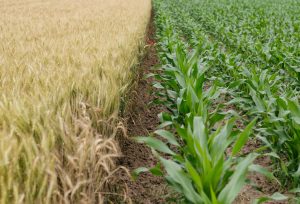Long-term and diverse organic crop rotations lower risk by stabilizing net returns over time
 Photo credit: Henry Be
Photo credit: Henry Be
A cost/return analysis published in Agronomy Journal compared production costs, yield and net returns for conventional versus organic crop rotations. The study revealed that the longest, most diversified organic crop rotation was the most financially secure cropping system, and lower yields for organic crops were offset by higher premiums. Five cropping systems were measured: three organic rotations, all tilled with a moldboard plow (2-year corn-soy, 3-year corn-soy-wheat, 6-year corn-soy-wheat-alfalfa), and two conventional rotations either chisel tilled, or no-till (3-year corn-soy-wheat). Overall production costs were about the same across the systems, but where the money was spent differed for conventional versus organic systems. For instance, costs associated with tilling were lower in conventional plots, but expensive herbicides offset that savings. While the organic systems saved money with lower expense for seed, fertilizer, and field operations, and did not purchase pesticides, the cost of tilling offset these savings. Yield was consistently lower in organic crops, though the margins were reduced in “good” years and the difference was recovered in the higher price premiums for the organic crops.
Across the nine-year study, the six-year organic rotation accumulated the highest returns. There was no difference between overall returns from the other organic and conventional systems. While there was a lot of variability across systems and years, organic alfalfa provided the most profit stability when it was the only system to make a profit in an extremely dry year and all other grains failed. The take-home message from this thorough analysis is that organic production costs and returns are similar to conventional. Therefore, investing in organic should not result in a loss. On the contrary, if planting longer and more diversified rotations, organic can provide more profit stability in the long run.

